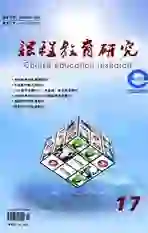Benefits and Drawbacks of Using New Technologies When Learning
2018-05-19于菁华
于菁华
【摘要】用新科技的優势助学英语,约束自己不被新科技的便利所诱惑,使英语学习达到预期目的。
【关键词】英语学习 新科技
【中图分类号】H319 【文献标识码】A 【文章编号】2095-3089(2018)17-0122-01
There are new technologies products invented or produced every day in the digital era. And new technology is also applied in language learning. Ten years ago, seeing a new word, we used to take a note first and found the words definitions and usages in a thick dictionary. But learners only need to download a digital dictionary application on his/her smart phone to search the new word now. Some new technologies applications can let the learners only use their smart phone scanning the word even without typing it. New technology is changing our life. People begin to concern over new technology application in learning. They all believe that there are positive and negative aspects for using technology to learn.
Firstly, using new technology for learning can enhance students learning skills. At Intense English Language Program (IELP), all the writing classes are set in the schools computer lab. Students learning is more convenient and efficient. Now in the IELP writing class, students can easily search materials on the Internet. By using D2L, “an integrated learning platform designed to create a single place online for instructors and students to interact, either for a completely online course or as a supplement to a face?鄄to?鄄face course.”(as cited in http://prairiestate.edu/) students can quickly communicate with their teacher and receive detailed feedback and all classmates can read others writings timely to compare with each other in order to discover our ignorance and obtain new thoughts. Teachers always use many programs such as Kahoot and Peardeck, let students do word practice, do surveys and even some pop quizzes. By using new technologies in learning students can develop their abilities.
Secondly, new technology can stimulate peoples brain abilities to handle different types of information. Dretzin is a well?鄄known producer, in her article Digital Nation (2010) she has mentioned an experiment about comparing peoples brain activities when read a book and use Google. The result shows that when using Google the brain activities are “more than a two?鄄fold increase in the extent of activity”. Furthermore a famous psychologist Steven Pinker (2010) said that “the Internet and information technologies are helping us manage, search and retrieve our collective intellectual output at different scales, from Twitter and previews to e?鄄books and online encyclopedias.”
Teachers can prevent students from cheating or plagiarism by new technology. Utilize new technology to make the assignments hard to plagiarize. Some software and anti?鄄plagiarism services such as Turnitin.com to submit students assignments or papers will immediately detect the materials taken from websites based on billions of online files and materials.(Gabriel, 2010;Coughlan, 2014; Slobogin, 2002) Teachers can also know their students degrees of understandings. Besides, teachers can also use the new technology to test their assignment. In this way to improve the quality of homework or papers in order to enhance the ability of students to think and to finish work independently.
As a popular saying goes, “Every coin has two sides.” Using new technologies in learning is of no exception. It Does have negative aspects. An article by Carr, a famous author in technology area includes an experiment done by Stanford Universitys Communication between Humans and Interactive Media lab. It shows that using many technologies may distract students. With so many functions included, its hard for learners to focus on one thing. In addition, new technologies weaken the peoples analytical ability to categorize information from detail (Carr, 2010). For example, while students are finishing assignment, it is easy for them to find material without much practice or thinking, the quality of the assignment will be poor.
To sum up, we should try to bring the advantages of using new technologies in learning into full play, and cut down the disadvantages to the minimum at the same time. In this way, students can develop strategies of self control without indulging in the games designed by the new technologies. Teachers can teach students not to cheat but to help them organize their time. In that case, we will definitely make a better use of new technologies in learning.
References:
[1]Carr, N. (2010, June 5). Does the Internet make you dumber. The Wall Street Journal.
[2]Coughlan, S. (2014, May 8). Harvard to adopt student honesty pledge.
